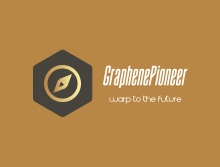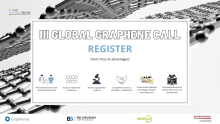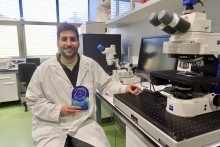Related news by tag TECHNOLOGY TRANSFER
An agreement to encourage research and transfer it to the market
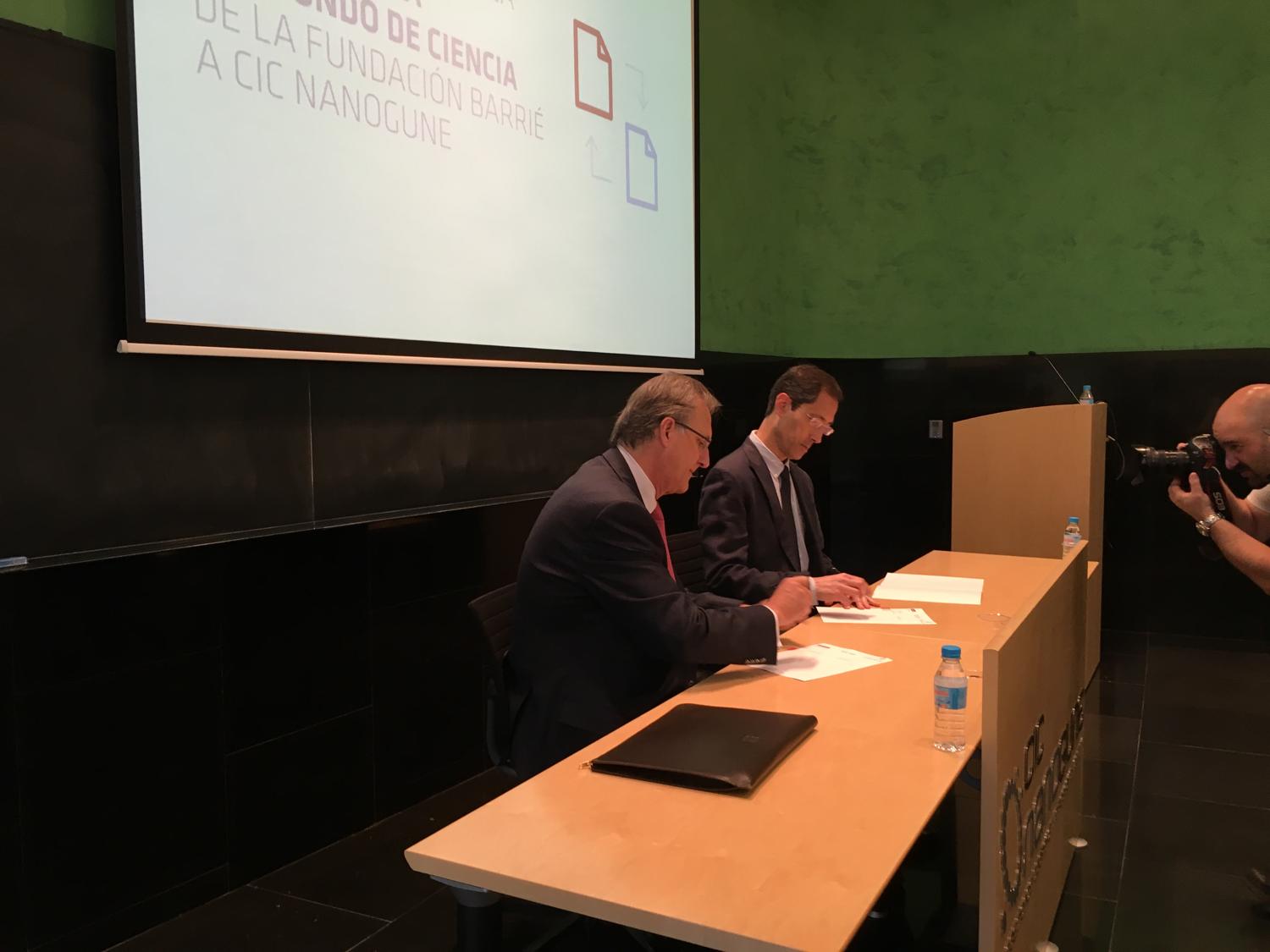
As the Foundation’s chairman explained, “the Barrié Foundation's Science Fund, based on the ‘learning-improving by doing’ philosophy, has provided us with a tool to design, develop and validate a proven, practice-based methodology, and we are now making it available to nanoGUNE. This way we are fully meeting our aim to design and model new paths that can be replicated by other players”. The Science Fund was set up in 2011 and is a tool for establishing a methodology and creating a bridge so that excellent research will reach the market and so that the market will return it in the form of patents, licences, contracts with companies, etc. “The agreement aims to free up and adapt a methodology, a roadmap that can facilitate the process to develop and market the outcomes of research in our area,” pointed out Jose M. Pitarke. Even though it is true that, owing to the diverse nature of the results and their potential application in different markets, there are no single recipes in the field of technology transfer, this tool allows us to get to know experiences that have worked in specific fields and to adapt them to our own developments,” he added.
This agreement between nanoGUNE and the Barrié Foundation will enable nanoGUNE to follow this adaptable roadmap for the researchers at this centre based in Donostia-San Sebastian. This will allow them to further their knowledge about the characteristics and requirements of the processes to transfer results to the market, and that way they can anticipate and forecast the transfer possibilities from the moment the research projects are designed. That is why “our intention is to get to know the methodology and pass it on to our researchers so that within the centre itself one can anticipate from the start the needs and difficulties that the potential marketable results may encounter and thus facilitate their development,” explained Pitarke. On the other hand, and given the collaborative nature of nanoGUNE, “we will be incorporating this methodology into collaboration projects either via programmes of the Basque type (Government of the Basque Autonomous Community, Chartered Provincial Council of Gipuzkoa) in support of R&D and technological development or else via international programmes that provide for commercial exploitation (Horizon 2020),” concluded Pitarke.
A Science Fund to encourage innovation
The Barrié Foundation’s Science Fund finances the phases involving the valorization, proof of concept and marketing of scientific and technological results generated in the Galician research system; they are ones that have marketing potential and are led by scientists and researchers of recognised solvency. It also acts as a strategic partner in the valorization of the research results, in exploiting them commercially and in spreading them to society. In this task it receives the advice of an international group of experts, including the technology transfer company of the University of Oxford, ISIS Innovation. Throughout the process the Foundation accompanies and supports the team from very close quarters and through all the phases of the process by contributing business intelligence, management capacity, professionalization of analysis and strategy and makes available to the project the whole network of contacts that the foundation has been developing throughout its 50-year history. As a result, the Science Fund, initially worth € 5.5M, has supported five projects that so far have signified an investment close to € 3M, and four of these projects are still up and running. Two have led to start-ups and another two are in the marketing validation phase.
Measures to increase business demand for nanotechnology
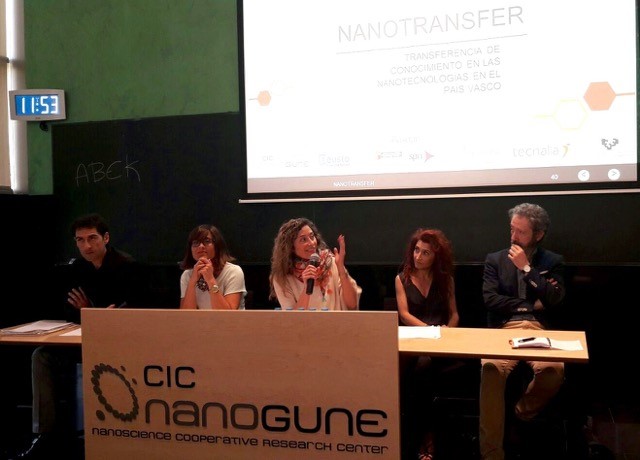
One of the major conclusions of the Nanotransfer project is the widespread permeability and multisectorial presence that nanotechnologies will achieve in coming years. In the opinion of the researchers from the six organisations that make up this consortium, the Basque Country must continue intensifying the development of nanotechnologies and their incorporation into the business sector. According to the project final report, unlike what has happened with other recent technologies, like ICT (Information and Communication Technologies) and biotechnologies, nanotechnologies will not form their own sector, but instead will be present in all sectors. Therefore, this project underlines, it is vital to facilitate the transfer to the market and the business exploitation of the progress made in the field of research.
The Basque Country lies in an intermediate position as regards the creation of nanoscience and nanotechnology patents in Europe (EU28), but not regarding their application in industrial processes and products, where its position is weaker. The need for specific equipment and instruments, the investment required by companies and the lack of qualified staff are major entry barriers that hinder the incorporation of nanotechnologies into industry.
Nonetheless, 60% of the Basque companies that have started to incorporate nanotechnologies acknowledge that they have obtained a new or improved product, and 30% confirm that they have achieved new or improved production processes.
The Nanotransfer project recognises the significant role played by existing companies of a certain size, with the capacity to invest in R&D activities when promoting the development of nano- and microtechnologies, unlike the situation in other fields, like biosciences, where the momentum takes place in start-up companies which have close links with universities and research centres.
Nanosciences and nanotechnologies in the Basque Country
Analysis of the current situation in the Basque Country shows different types of companies with nano-and microtechnological applications. Three main groups can be identified:
- Nanomaterials: group made up of larger companies, mainly in the metallurgical, chemical and plastic manufacturing sectors. These companies are relatively well-established in the market and perform product innovation activities.
- Nanobiotechnology: group made up of newer, smaller companies, created as spin-offs by the pharmaceutical industry from research centres, universities, etc. They are R&D intensive companies that incorporate nanotechnologies into their products.
- Micro-nanoelectronics: group made up of medium-sized companies that have incorporated micro- or nanotechnologies into their products.
Nearly three-quarters of companies with nanotechnological activity belong to the industrial sector, while the remaining quarter are in the service sector. The recipients of nanotechnological goods and services are also primarily industrial, especially in what is known as advanced manufacturing. Geographically, nanotechnologies are most prominent in Gipuzkoa, followed by Bizkaia. Gipuzkoa specialises more in nano-materials, nano-electronics and nano-instrumentation, whereas Bizkaia is more involved in nano-biotechnology.
Conclusions
The Nanotransfer project stresses the need to increase the capacity of company absorption and to strengthen appropriate transfer mechanisms for each of the contexts in nanoscience and nanotechnologies. It also highlights the potential provided by the Basque Country, bringing together a geographical concentration of scientific-technological skills that need to be transferred to the business sphere and, for this purpose, the project researchers recommend the incorporation into industry of professionals with a scientific knowledge base in order to facilitate the connection between developments in nanoscience and nanotechnologies and their potential commercial application. In the same vein, they also propose the promotion of transfer mechanisms based upon real collaboration between the different scientific-technological players, the shared use of infrastructures and staff mobility.
CIC nanoGUNE joins the Packaging Cluster
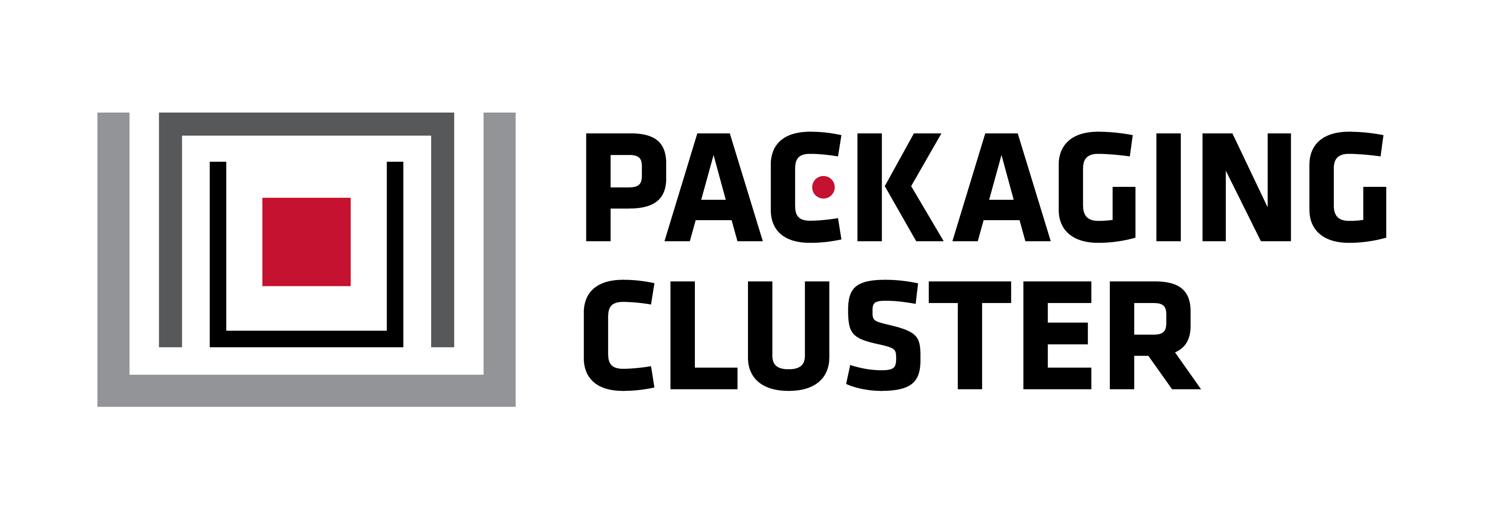
Set up by Catalan companies in 2012, the Packaging Cluster currently brings together 73 active members from among companies, knowledge centres and organisations working in the field of packaging and packing. The main aim of the Packaging Cluster is to further the competitive improvement of the companies that form it in order to generate more and better business for companies and organisations in the field of packaging and packing.
nanoGUNE joins forces with BerriUp and Graphenea to launch the Global Graphene Call
CIC nanoGUNE, BerriUP —a startup accelerator in Donostia— and Graphenea —nanoGUNE’s first startup devoted to the production and commercialization of graphene— have signed a collaboration agreement to drive forward proposals related to research in graphene. So for the first time we are launching the Global Graphene Call designed to develop business ideas linked to graphene.
The participants will need to submit legitimate, in-house projects, and to participate, the project will need to be submitted using the dedicated application form. The starting date for submitting projects is 24 February, 2020 and the deadline is 26 April, 2020.
The shortlisted applicants will be able to take advantage of a programme of customised acceleration at the BerriUp headquarters between June and August 2020, avail themselves of Graphenea material and make use of nanoGUNE’s scientific equipment.
The company GraphenePioneer winner of the first Global Graphene Call
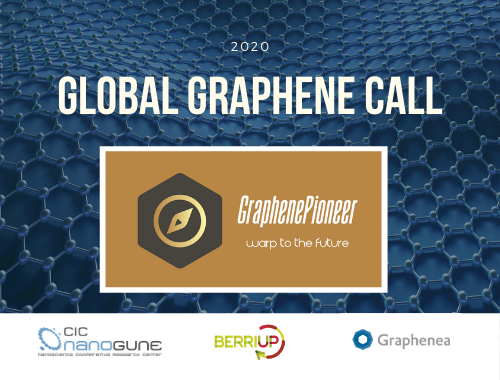
GraphenePioneer will be able to take advantage of a customized acceleration program between June and August 2020 organized by BerriUp —experts in business acceleration—, CIC nanoGUNE —the Basque Nanoscience Co-operative Research Center—, and Graphenea —nanoGUNE’s first start-up and a world leader in graphene production—. Thanks to the collaboration between these three organizations, the company will benefit from personalized coaching to boost the marketing of its graphene-based products.
This is the first time that CIC nanoGUNE, BerriUp, and Graphenea have joined forces to promote a call, the Global Graphene Call, designed to develop business ideas linked to graphene.
3rd Global Graphene Call: international call to promote innovative graphene-based projects
The Basque Nanoscience Research Center, CIC nanoGUNE, together with BerriUp —the number one private startup accelerator in Spain, according to the Financial Times—,
NanoGUNE hosts the Hamaiketako de Gerentes with a focus on quantum technologies
The session focused on quantum technologies and featured an inspiring dialogue between Ignacio Martín (board member at Repsol and Acerinox) and Juan Zufiría (board member at Bankinter and former IBM Executive Vice President), who shared their vision on leadership and innovation.
The event concluded with a visit to the System Two quantum computer at Ikerbasque building, offering attendees a glimpse into the future of computing.
EIT Jumpstarter award for CIC nanoGUNE’s Prospect Biotech business project
CIC nanoGUNE is fine-tuning the launch of Prospect Biotech, a business initiative that aims to optimise the production and monitoring phases of cell therapies such as CAR-T, thus making them more accessible and efficient. The new enterprise will be exploiting technology developed by the researcher Javier Plou at nanoGUNE; it has received backing from Basque Tek Ventures and the renowned EU EIT Jumpstarter programme, for which it received an award this very week at the Grand Final in Budapest.
CTECHnano, tailor-made solutions for the industry
“The aim is to provide solutions and consulting services for the development of processes and products to companies, and to offer also instrumentation or technical means so that they can do it in their own facilities” explains the Ikerbasque professor Mato Knez, leader of nanoGUNE´s Nanomaterials group and scientific advisor of CTECHnano.
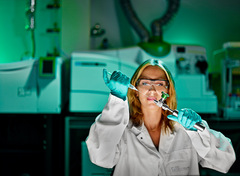
CTECHnano is focused on customers looking for innovative products, working to overcome challenges in the field of thin-film coatings or trying to improve theperformance of their current processes. “We are thinking about sectors that seek innovation in order to open new markets. There are many industries that produce in the same way as they did twenty or fifty years ago”, tells Mato Knez. “Our idea is to help them to innovate by using the ALDtechnology. In this way they may adapt and improve the functionalities and properties of the materials, eventually obtaining new products” adds Knez. CTECHnano has a very strong experience in applying ALD technology to a variety of materials. “If a customer needs a tailored solution for a challenging development of materials, we will be offering a solution wherever possible. For this purpose, we have appropriate instrumentation for processing and characterization as well as the experience, as nanoGUNE´s Nanomaterials group is a reference in the use and development of this technology.
Why using ALD technology?
ALD technology allows changing the properties of materials. A very thin layer of only a few nanometers is deposited onto the substrate covering its entire surface. With such thin coatings many properties of the original material are retained, but at the same time, additional properties can be supplemented.
ALD provides a very controlled way to deposit thin films with thickness control on the atomic scale. Also, the growth of multilayer structures composed of different materials is straightforward. Due to the precision of the process and its reproducibility, it is already an established processing technology in the field of modern micro and nano electronics. ALD is typically run at temperatures lower than the competing vacuum based deposition processes, including chemical vapor deposition or thermal evaporation. The lower processing temperature additionally allows working with fragile substrates, such as biological or polymeric samples. This small, but important difference makes ALD the method of choice for many emerging applications such as, flexible electronics or composite materials design.
A strong team
Although being new, the company unites an experienced and complementary team working together. nanoGUNE has been the promoter of CTECHnano and two more companies —AVS and Cadinox— joined nanoGUNE for bringing CTECHnano to life. AVS and Cadinox have broad experience in design, manufacturing, integration, test and delivery of equipment to technology driven markets. “They are two ideal and strong partners for CTECHnano” says David Talavera, manager of the company. “The most important point is that all together we have the scientific and technological capability to beneficially adapt to customers´ needs”, he adds.
CTECHnano’s website is www.ctechnano.com
CIC nanoGUNE
The CIC nanoGUNE Nanoscience Cooperative Research Center, located in Donostia-San Sebastian (Basque Country), is a research center set up with the mission to perform word-class nanoscience and nanotechnology research for the competitive growth of the Basque Country.
AVS
AVS (Added Value Solutions) conceives and delivers scientific instrumentation in the fields of Astrophysics, Particle physics, Space and Neutron and X ray sources. AVS designs and develops high precision instrumentation working under harsh environments such us UHV, Radiation, High magnetic fields and cryogenic temperatures, covering design, manufacturing, integration, test and delivery under EN 9100 certification. AVS offers effective reliable and innovative solutions for technology driven markets. It is an open minded, flexible and creative organization ready to take new challenges and new ventures.
Cadinox
CADINOX, familiar company since 1966, dedicates to the mechanowelded fabrications of equipemnts for complex and unique installations. In its facilities located at Belauntza, 8600 covered s.m. with weight capacity up to 60 tons, 65 qualified people cover all the processes to offer an integral solution: cutting, forming, welding and associated NDT, surface treatment and final machining. It includes also the testing and mechanical assembly operations.

